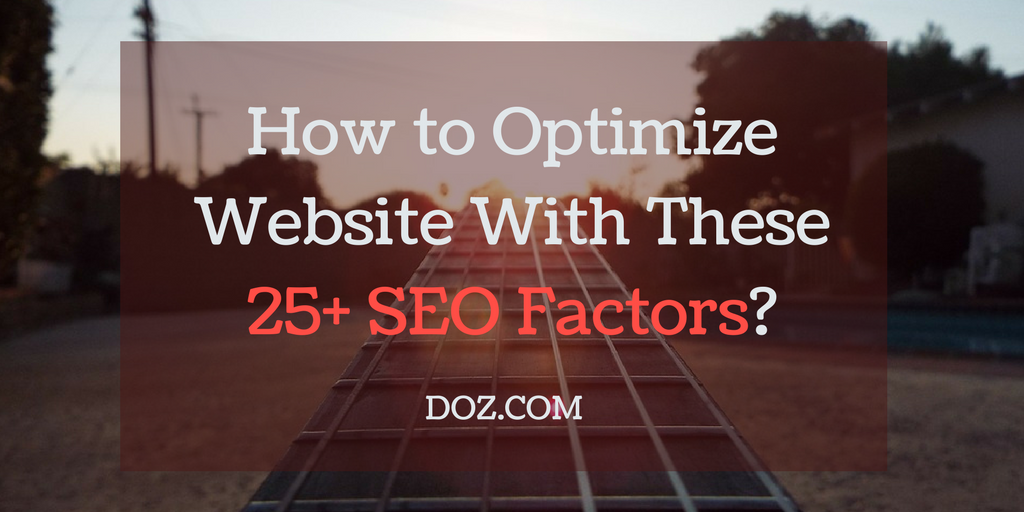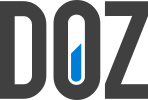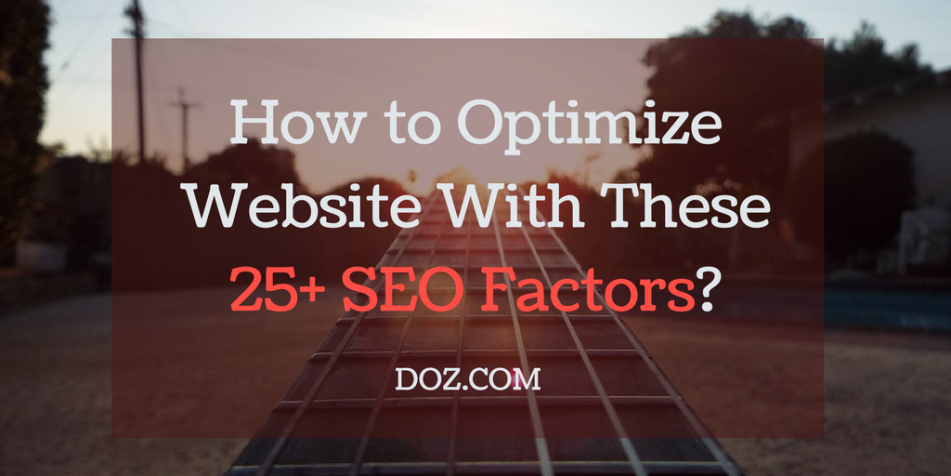
This is an article by Rahul Ghundiyal. He is 4 years experienced person and CEO of RNG SEO. He loves his area of expertise and do work within his limits for helping small and medium businesses to increase traffic. Well Graduated Guy and looks to do good research while writing. Feel free to follow him on Twitter, Facebook, and Linkedin etc.
SEO Factors play a crucial role in improving the performance of the site and driving massive traffic to the site. They are mainly classified into two types- On Page and Off Page SEO.
On Page SEO Factors
They are referred to those activities that are performed directly on the site to improve the visibility of web pages in the search engines. Here is the list of on page factors and how to optimize them on the site.
-
Website URL Structure
It should be clean and short optimized by adding one main keyword of the page keeping it under 110 characters.
-
Meta Title
Add one main keyword avoiding stuffing it with the keywords and keep it under 65-70 characters. It should be attractive enough to get the clicks by the users. All the titles on the site should be unique.
-
Meta Description
The description should explain the title well and unique for all the web pages in 150- 160 characters. Avoid stuffing the keywords and instead of it provides valuable information to the searchers. This will help in improving the click through rates of web pages.
-
Keyword Optimization
Optimize the keywords naturally in the content maintaining 1-2% keyword density. Remember to keep the proper keyword proximity which is defined as the distance between the keywords. Try to keep the proximity less for better results.
-
Image Optimization
Use the original images and name them as a descriptive file name instead of image1.png. Optimize their size by using a content delivery network which will also help them to load at a very fast rate. Add the main keyword in the ALT text.
-
Internal Linking
It helps in increasing the time spent and reducing the bounce rate of the site. It is effective in telling search engines which pages are important and take users to other pages of the site. Remember to add links that are relevant and provide value to the users.
-
Canonical Tags
Add a canonical tag to one main URL to avoid the duplicate content on the site. This tag tells the search engine to consider only one preferred version of the web page.
-
Speed
The site should load in 3-5 seconds in order to provide the better user experience. Reduce the size of the image, use CDN and minify the JS and CSS scripts to load the site in a quick time.
-
Resolve Errors
Identify the errors such as 404 broken link errors. Fix them and improve the customer experience. You can add permanent redirection 301 to pass the link juice or delete them if the links are not linked to other pages on the site. Also, fix other errors such as 500, 503, etc.
-
Crawling and Indexing
Crawling refers to the following links by the search engine bots and indexing means listing web pages in the SERPs. For better visibility, it is important to have continuous crawling and indexing.
-
No Index/ No follow
If you don’t want to index the specific web page, then add the no index tag. No follow tag is used when you don’t want to pass the link juice to the particular web page and it is mainly used for external links.
-
Robots.txt
This is a file which allows or disallow the search engine bots to crawl the web pages, directories or files on the site.
-
Redirections
There are two types of redirections. A permanent redirection is called 301 used for passing the link juice. Temporary redirection is called 302 which is used for temporary purposes.
-
Mobile Friendliness
Mobile searches and users are growing significantly and will continue to rise in the coming years. It is important to have the mobile version of the site to comply with the mobile first indexing. You can also add the accelerated mobile pages to load the site extremely fast on the mobile devices.
-
Addition of Tracking Codes
It is crucial to measure and analyze the results. Add Google Analytics code to monitor, analyze and improve the performance of the site. For resolving technical errors add Google webmasters code.
-
Schema Implementations
These are the mark ups used to enhance the Meta descriptions of the web pages. You can add organization, website, price, video, article, event, product schema mark ups.
-
Social Sharing Buttons
These encourage the social sharing of the posts by the visitors on their favorite social media channels. The social count helps in improving the authority and credibility of the brand and increases the visitors to the site.
-
Text/ HTML Ratio
The ratio is defined as the text or visible content on the site to the non-visible content such as graphics or images. Ideally, it should be 25-70% for the site.
Off Page SEO Factors
These are activities that are not performed directly on the site and mainly help in improving the authority and credibility to the site. Here is the list of off page SEO factors to optimize the site.
-
Domain Authority
DA refers to the complete authority of the domain. It ranges from 0-100 where 0 is the minimum and 100 is the maximum. Build links for the site to improve it.
-
Page Authority
PA refers to the authority of the specific page. It ranges from 0-100 where 0 is the minimum and 100 is the maximum. Build links for the specific page to increase this.
-
Citation Flow
This is the score based on the consistency of the citation on the web. The citation refers to the Name, Address, Phone Number and Website. Build citations on the authoritative site to improve this score.
-
Trust Flow
This is the score based on the credibility of the site amidst the audience. Link building and link earning techniques will improve this score. Avoid building the spammy links on the site.
-
Link Juice
It is referred to as the authority passed to the site from the quality links. This is very useful in improving the Page Rank of the site. Build high-quality links on the authoritative sites.
-
Page Rank
PR ranges from 0-10 where 0 is the minimum and 10 is the maximum. The score can be increased by performing continuous off page optimization. For better results, follow the latest and trendy link building techniques.
-
Anchor Text
It is the text, keywords or phrases hyperlinked pointing to other web pages on or outside the side. Build rich anchor texts by linking the relevant keywords naturally on the site or other high authority sites. Avoid the keyword cannibalization by not linking the main keyword of the web page to the other web page on the site.
-
Social Shares
They help in earning the trust of the visitors and encourage the social sharing of the posts on different social media platforms. This is helpful in increasing the social engagements and traffic to the site.
Wrap Up
Now that you know all the SEO factors and tips to optimize the website, audit the site and perform the search engine optimization. All these techniques will help in improving the visibility and ranking of the site in the search engines or you can contact SEO Consulting. Site optimization will not only help to increase the organic traffic but also boost the conversion to the site.



9 Comments
I like what you guys are up too. This kind of clever work and coverage!
Keep up the fantastic works guys I’ve added you guys to our blogroll.
Sutter Health
I’m really enjoying the theme/design of your web site. Do you ever run into any browser compatibility issues?
A couple of my blog readers have complained about my site not operating correctly in Explorer but looks great in Safari.
Do you have any advice to help fix this problem?
It’s fantastic that you are getting thoughts from this article
as well as from our discussion made at this
place.
수면asmr
Hi there to all for the reason that I am genuinely keen of reading this website’s post to be updated on a regular basis. It carries pleasant stuff.
Superb post however I was wanting to know if you could write a litte more on this topic? I’d be very grateful if you could elaborate a little bit more.
very informative articles or reviews at this time.
I like the efforts you have put in this regards for all the great content.